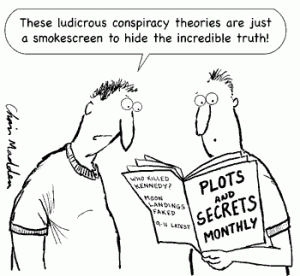Theory
This module is concerned with the one of main tasks of research,
which is the construction of good theory.
Topics
-
What is theory?
-
Qualities of a good theory
-
Mechanisms/process
-
How to theorize
-
The problem of
causality
-
Inductive/Deductive/Synthetic
-
Perspectives on
theory
-
Role of hypotheses
-
Process vs
variance models
Readings (descending priority)
- Lave,
Charles A., and James G.
March.
1993(1975). An Introduction to Models in the
Social Sciences. New York: University Press of America.
- Chapter 2 [pdf]
- Chapter 3 [pdf]
- Schweizer, T. Epistemology. In Bernard (ed) 1998.
Handbook of Methods in Cultural Anthropology. [pdf]
- [example of theorizing] Strength of Weak Ties.
Granovetter,
M. (1973), "The Strength of Weak Ties," American Journal of
Sociology, 78 (6): 1360-1380 [^pdf]
Handouts
-
Borgatti.
Theorizing
-
Borgatti.
How
to Theorize
- Trochim. Conceptualizing. [php]
- In class similarity judgments of the linguistic
domains of theory and hypothesis [html]
Online
Slides
- Borgatti. 2008. Applied theory. Academy
of Management conference, Anaheim. (abridged) [pdf]
|
|

(actually, it was Kurt Lewin, social pychologist,
who said this -- not the guy in the picture)
"This isn't right. It's
not even wrong."
-- Wolfgang Pauli, on a paper he was
asked to comment on

"The limits of my language mean the limits of my
world." -- Ludwig Wittgenstein, Tractatus Logico-Philosophicus (1922)
Software
|
Bibliography
Highly Recommended
- Lave,
Charles A., and James G.
March.
1993(1975). An Introduction to Models in the
Social Sciences. New York: University Press of America
Management/Sociology Scholars on Theory
-
Mayhew, B. 1980. Structuralism vs.
individualism part 1: Shadow boxing in the dark. Social Forces
:335-375. [^pdf]
-
Weick, K. E. (1995).
What theory is not, theorizing is. Administrative Science
Quarterly, 40(3), 385-390
-
Sutton, R. I., & Staw,
B. M. (1995). What theory is not. Administrative Science
Quarterly, 40(3), 371-384.
-
Van Maanen,
J. (1995). Style as theory. Organization Science, 6(1),
133-143.
-
Stinchcombe, Arthur. 1968. “Fundamental Forms of
Scientific Inference.” Pp. 15-28 in
Constructing Social Theories. New York: Harcourt,
Brace, and World.
-
The measurement problem: A gap between the
languages of theory and research by H. Blalock, ch. 1 in
Methodology in Social Research.
-
Locke, E.A. and Latham, G.P. 2004. What should
we do about motivation theory?: six recommendations for the
twenty-first century. Academy of Management Review,
29(3): 388-403.
-
Bacharach, S.B. 1989. Organizational theories:
Some criteria for evaluation. Academy of Management Review,
14(4):496-515.
-
Reynolds, P.D., 1971, Forms of theories, ch. 5
in A Primer in Theory Construction by NY: Bobbs-Merrill
-
Stinchcombe, A. The Logic of Social Research. U of Chicago
Press.
-
Arthur L. Stinchcombe. 1991.
The Conditions of Fruitfulness of Theorizing
About Mechanisms in Social Science. Philosophy of the Social
Sciences, Vol. 21, No. 3, 367-388
-
D.A.
Whetten, "What Constitutes a Theoretical Contribution?," Academy
of Management Review, Vol. 14, No. 4 (1989), pp. 490-495.
-
Ken G.
Smith, Michael A. Hitt (eds).
Great Minds in
Management: The Process of Theory Development: Especially
Hambrick chapter.
-
Robert
K. Merton, Social Theory and Social Structure.
-
Lawrence, B. 1997. The Black Box of
Organizational Demography. Organization Science, Vol. 8, No.
1 (Jan. - Feb), pp. 1-22 [^pdf]
Philosophy of Science on Theory
-
Lakatos,
I. (1971). History of science and its rational reconstruction.
In R. C. Buck & R. S. Cohen (Eds.), PSA. Reidel
-
Imre
Lakatos, "Falsification and the Methodology of Scientific
Research Programmes" in The Methodology of Scientific Research
Programmes, edited by John Worrall and Gregory Currie
(Cambridge: Cambridge University Press, 1978), 91
-
Popper, Karl (1963), Conjectures and Refutations,
Routledge and Kegan Paul, London, UK, pp. 33–39. Reprinted in
Theodore Schick (ed., 2000), Readings in the Philosophy
of Science, Mayfield Publishing Company, Mountain View,
Calif., pp. 9–13.
-
Kaplan, A. 1964 The Conduct of Iinquiry: Methodology for Social
Science. San Francisco: Chandler.
Process and
Variance Models
-
Mohr, L.
1982. Explaining Organizational Behavior. SF: Jossey-Bass.
-
Pfeffer.
Review of Mohr, L. 1982. Explaining Organizational Behavior. SF:
Jossey-Bass. Administrative Science Quarterly, Vol. 28, No. 2
(Jun., 1983), pp. 321-325 [^pdf]
-
Fichman
Variance explained: why size does not (always) matter (1999).
Research in organizational behavior [pdf]

Send mail to
sborgatti@uky.edu with
questions or comments about this web site. Copyright © 2008
by Steve Borgatti. Last modified:
08/10/09.
|
